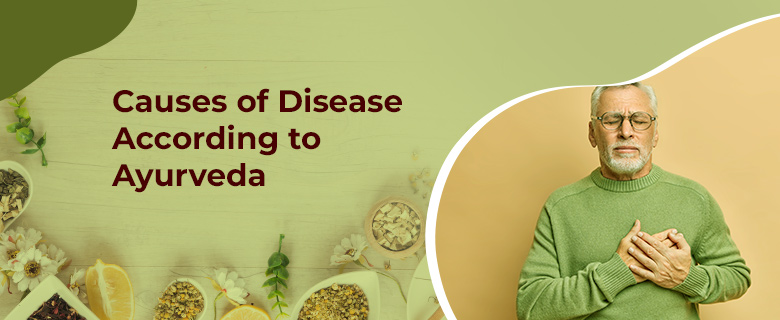
Causes of Disease According to Ayurveda
Ayurveda, derived from the combination of two Sanskrit words Ayu (life) and Veda (knowledge), is termed ‘Science of Life’. India’s timeless medicinal wisdom fundamentally believes that the health of a person is not just limited to the body but consists of a harmonious balance between the physical, mental and spiritual well being of the individual. Unlike modern medicine, ayurvedic health care is more focused on healthy living or prevention rather than treatment of diseases.
Ayurvedic texts state that the human body consists of doshas (bio energies), dhatus (tissues), mala (waste) and agni (digestive fire or metabolism). Their smooth functioning is the key to good health while any imbalance or disturbances will cause diseases.
- Doshas – derived from the Sanskrit word dosa, means faulty or diseased. Ayurveda says that the universe is made up of Panchmahabhutas namely earth (prithvi), water (jal), fire (agni), wind (vayu) & space (akash). These 5 core elements are present in every living being and are responsible for the formation of doshas. A combination of these elements results in tridoshas – vata, pitta and kapha. These tridoshas form the functional energies in the human body and are responsible for an individual’s physical, mental and emotional health. The tridoshas transport the byproduct of digested food across the body to help build body tissues. Thus, any imbalance in the functioning of the tridoshas can cause health problems. Vata dosha (space/air) controls breathing, blood circulation, and heartbeat. Pitta dosha (fire and water) regulates metabolic functions such as digestion and temperature. Kapha dosha (water and earth) keeps the body hydrated, strengthens immunity, keeps the joints stable.
- Dhatus – Ayurveda categorizes dhatus or body tissues into seven types or saptdhatus namely Rasa (plasma), Rakta (blood), Mamsa (muscle), Meda (fat), Asthi (bone), Majja (bone marrow) and Shukra (semen). These saptdhatus provide basic nutrition to the body and help growth of both body structure and the mind. Dosha imbalance affects the dhatus, where they either become defective or extreme resulting in diseases.
- Mala – Malas are the waste products of the body. There are three main types of malas or trimala namely Purisha (stool/faeces), mutra (urine) and Sveda (sweat). The trimalas are the waste removal system of the body and help to maintain and regulate daily functions of the organs. Any imbalance between the tridoshas can hinder proper elimination of the malas and lead to health problems.
- Agni – Ayurveda believes that the digestive fire/Agni is the main catalyst that converts food into energy and is the driving force responsible for good health, strength, teja, oja and prana or life energy. The digestive system of the body is the vital organ that sustains the overall health where the agni or the inner fire in the body helps stimulate key metabolic functions like digestion, sensory perception, immunity, cellular functions and more. Any weakening of the agni will disrupt the effective working of the digestive system leading to diseases.
Concept of disease as per Ayurveda
Acharya Charak states in the Charak Samhita – that which produces mental grief is aadhi and that which causes many types of pain and grief in both body and mind is called vyadhi or disease. So, disease is basically a state of mind and body that causes discomfort and anguish.
Concept of disease in ayurveda is based on the belief that the inner ecosystem (of the mind & body) is always interacting with the outside surroundings and any imbalance between the working of the two can lead to diseases. The cause for the imbalance can be both Agantuk (external) or Nija (internal).
Causes for disease as per Ayurveda
According to Ayurveda, the root cause of any vyadhi or disease is the imbalance of the tridoshas – vata, pitta and kapha. The causes are divided further…
Pradnyaparadha (pradnya means wisdom and aparadha means transgression in Sanskrit) means misuse of wisdom. Performing actions, physical or mental, that are harmful to the mind and body, that which aggravate the tridoshas, stimulate the rajas and tamas gunas can cause diseases.
Atiyoga/overindulgence of sense organs such as listening to loud music constantly, eating extra spicy food all the time etc. that can lead to diseases.
Hina yoga/deficiency or poor association of sensory organs, where activities are not performed adequately, such as not hearing a word or staying in silent surroundings, not consuming food with any spices etc. can cause ailments.
Mithya yoga or wrongful indulgence of sensory organs such as living in extremely loud, noisy surroundings at all times, consuming non- compatible, extremely spicy food in extreme quantities etc. can also cause illnesses.
Asatmendriyartha samyoga or misuse of senses can result in over stimulation or deficiency of sensory activity harming both the mind and body.
Kala/parinama or seasonal changes (extreme heat, cold, rains etc.) influence the tridoshas and can lead to diseases (aging etc.)
Karma or improper activities of mind, body and speech can cause aggravated tridoshas, leading to many diseases that are related to tissues, organs, bones and joints.
External factors such as wrong dietary choices, sedentary lifestyle, extreme weather conditions are also capable of causing diseases. These factors create a physical imbalance first that later penetrates the mind through tridoshas disturbance. Aggravated vata dosha can cause depression, anxiety and fear. Pitta dosha increase can lead to anger, jealousy and an imbalanced Kapha dosha can lead to feelings of greed and possessiveness. In fact, there is a close connection between these factors and tridoshas imbalance which can cause many diseases, both physical and mental.
Following Ayurveda recommended diet & lifestyle can go a long way in preventing dosha (vata & pitta) imbalance and prevent diseases. Book an ayurvedic consultation with an experienced Ayurvedic Vaidya for a personalized diet and exercise plan to keep your mind and body in harmony and enjoy a healthy, disease-free life.





0 Comment
No comments found.Thank you. Your comment will be visible after an approval.
Add your comment